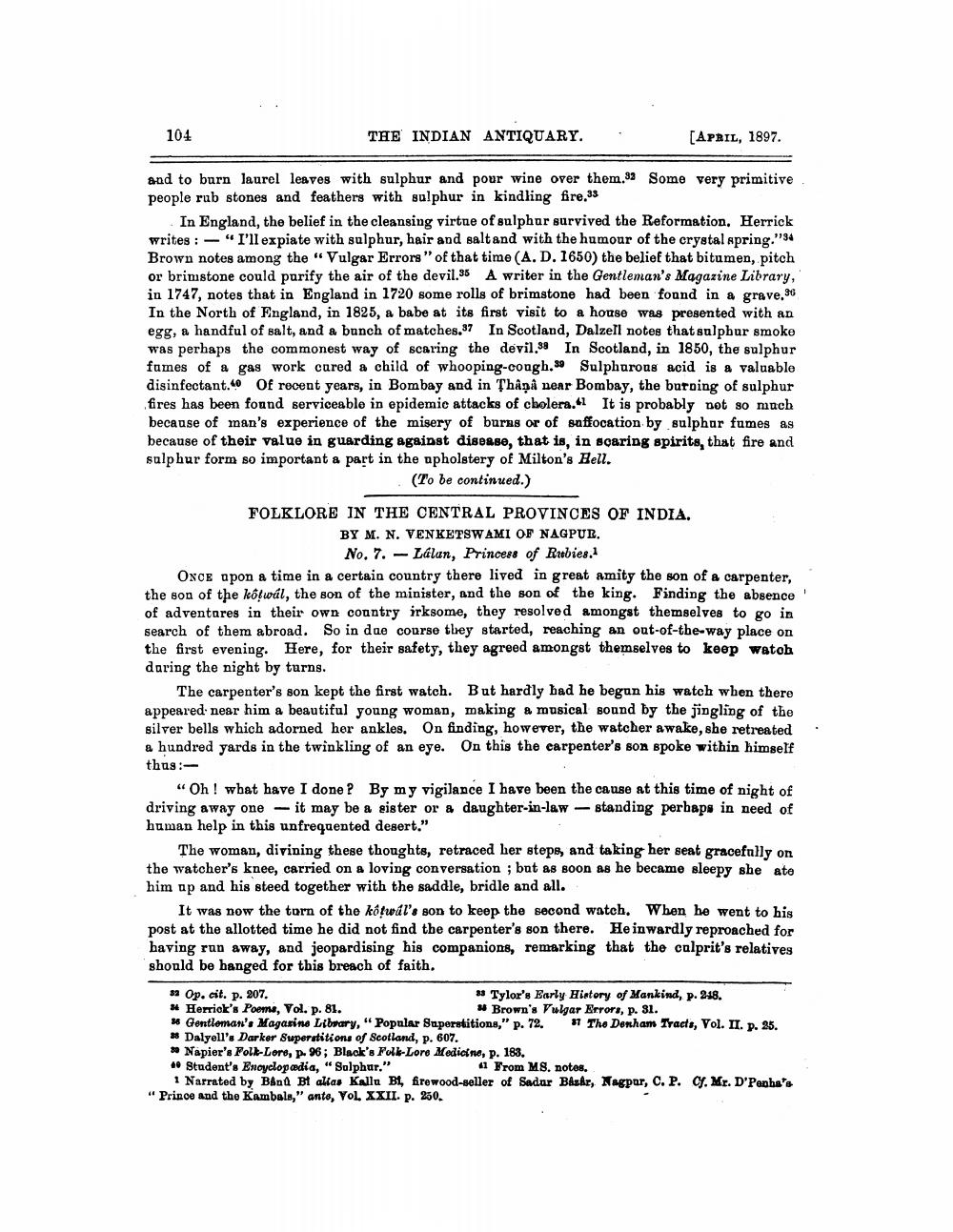________________
104
THE INDIAN ANTIQUARY.
[APRIL, 1897.
and to burn laurel leaves with sulphur and pour wine over them.33 Some very primitive people rub stones and feathers with sulphur in kindling fire,33
In England, the belief in the cleansing virtue of sulphur survived the Reformation. Herrick writes : - "I'll expiate with sulphur, hair and salt and with the humour of the crystal spring."94 Brown notes among the "Vulgar Errors" of that time (A.D. 1650) the belief that bitumen, pitch or brimstone could purify the air of the devil.35 A writer in the Gentleman's Magazine Library, in 1747, notes that in England in 1720 some rolls of brimstone had been found in a grave.96 In the North of England, in 1825, a babe at its first visit to a house was presented with an egg, a handful of salt, and a bunch of matches.37 In Scotland, Dalzell notes that sulphur smoke was perhaps the commonest way of scaring the devil,58 In Scotland, in 1850, the sulphur fames of a gas work cared a child of whooping-cough. Sulphurons acid is a valuable disinfectant.40 Of recent years, in Bombay and in Thânâ near Bombay, the burning of sulphur fires has been found serviceablo in epidemic attacks of cholera. It is probably not so much because of man's experience of the misery of burns or of saffocation by sulphur fumes as because of their value in guarding against disease, that is, in soaring spirits, that fire and sulphur form so important a part in the upholstery of Milton's Bell.
(To be continued.)
FOLKLORE IN THE CENTRAL PROVINCES OF INDIA.
BY M. N. VENKETSWAMI OF NAGPUR.
No. 7. - Lalan, Princess of Rubies.1 Once apon a time in a certain country there lived in great amity the son of a carpenter, the son of the kółwil, the son of the minister, and the son of the king. Finding the absence of adventares in their own country irksome, they resolved amongst themselves to go in search of them abroad. So in dae course they started, reaching an out-of-the-way place on the first evening. Here, for their safety, they agreed amongst themselves to keep watoh daring the night by turns.
The carpenter's son kept the first watch. But hardly had he began his watch when there appeared near him a beautiful young woman, making a musical sound by the jingling of the silver bells which adorned her ankles. On finding, however, the watcher awake, she retreated a hundred yards in the twinkling of an eye. On this the carpenter's son spoke within himself thus:
“Oh! what have I done? By my vigilance I have been the cause at this time of night of driving away one - it may be a sister or a daughter-in-law - standing perhaps in need of human help in this unfrequented desert."
The woman, divining these thoughts, retraced her steps, and taking her seat gracefully on the watcher's knee, carried on a loving conversation ; but as soon as he became sleepy she ate him ap and his steed together with the saddle, bridle and all.
It was now the torn of the kôtwal's son to keep the second watch. When he went to his post at the allotted time he did not find the carpenter's son there. He inwardly reproached for having run away, and jeopardising his companions, remarking that the colprit's relatives should be hanged for this breach of faith.
5 Op. cit. p. 207.
38 Tylor's Early History of Mankind, p. 248. # Herrick's Poems, Vol. p. 81.
# Brown's Vulgar Errors, p. 31. * Gentleman'. Magazine Library, "Popular Superstitions," p. 72. 97 The Dorham Tracts, Vol. II. p. 25. * Dalyell's Darker Superstitions of Scotland, p. 607. # Napier's Foll-Lore, p. 96; Black's Folk-Lore Medicine, p. 183. ** Student's Enoyclopædia, “Sulphur."
4 From MS. notes. 1 Narrated by Band Bt alias Kallu Bt, firewood-seller of Sadar Bazar, Nagpur, C. P. C. Mr. D'Panha's "Prince and the Kambals," ante, VOL. XXII. p. 250.




